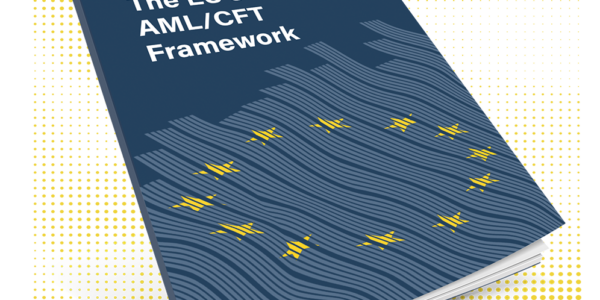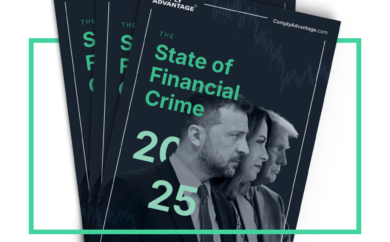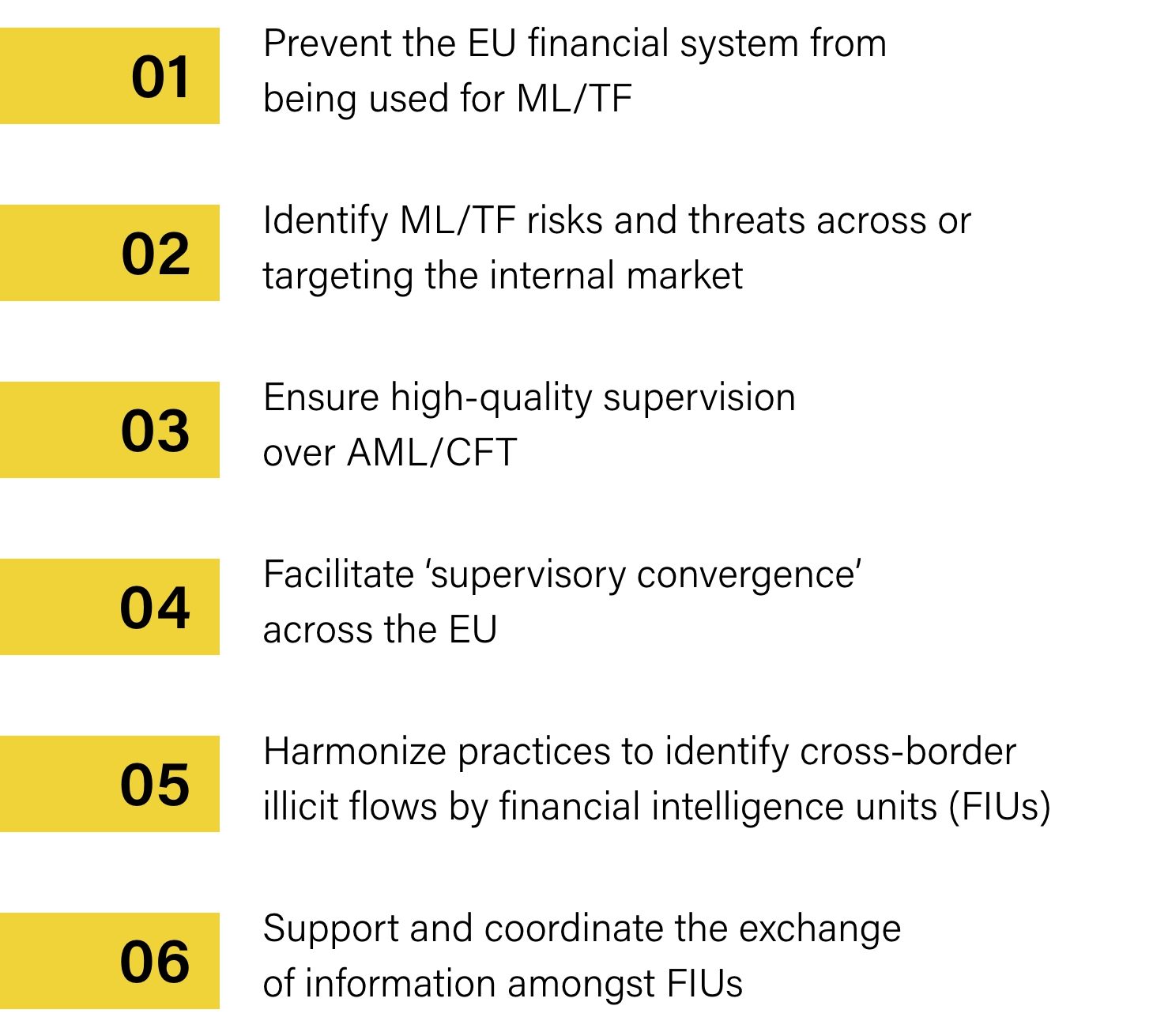Since Russia’s invasion of Ukraine in February 2022, the European Union (EU) has been focused on creating strong sanctions against the Putin regime. While the attention has been on punishing Russia and creating incentives for them to stop, there has also been ongoing work to reform the EU’s framework for fighting financial crimes through the EU AML Reform Plan.
What is the EU’s anti-money laundering authority (AMLA)?
The EU’s Anti-Money Laundering Authority (AMLA) is a supervisory body established by the EU Commission to oversee and enforce laws aimed at preventing money laundering and terrorist financing across member states.
In the latter half of the 2010s, major European financial institutions (FIs) were involved in anti-money laundering (AML) scandals and frauds. As a result, the EU faced pressure to address the perceived shortcomings of its AML and countering the financing of terrorism (CFT) framework. In response, the EU Commission, based in Brussels, proposed an action plan in May 2020 and concrete reform proposals on July 20, 2021, to address these issues.
A key component of the package is the regulation establishing the “Authority for Anti-Money Laundering and Countering the Financing of Terrorism and Amending Regulations” (AMLAR). The latest revised draft was agreed upon in December 2023. This regulation will establish a new supranational AML/CFT supervisor, called the Anti-Money Laundering Authority (AMLA).
The EU aims for AMLA to be the centerpiece of an integrated AML/CFT supervisory system in the EU. It will facilitate efficient cooperation between all relevant authorities and will be responsible for contributing to the implementation of harmonized rules. It will be a decentralized agency with a General Board in two compositions: one for heads of national FIUs and another for regulators. Additionally, it will have an Executive Board consisting of five independent members plus a Chair, and an Executive Director to run the agency. Following a series of joint public hearings held by the Council and Parliament in early 2024, the German city of Frankfurt was chosen as the location for the new agency.
New guide: Update on the European Union’s new AML/CFT framework
Explore each aspect of the EU AML reform package in detail. Analyze what organizations must do to prepare for new AML requirements, covering technology, training, governance, and oversight.
Download your copy
What powers will the new EU Anti-Money Laundering Authority have?
The AMLA regulation is expected to come into effect from July 2025, with the agency being established in the meantime. It is anticipated to begin direct supervisory activities by 2028. The authority will have several powers, including:
- Direct supervision over the “riskiest” obliged entities operating across borders, referred to as “selected entities.”
- Indirect oversight over other obliged entities through the supervision of supervisors or self-regulated bodies.
- Establishment of stronger common supervisory approaches.
- Maintenance of an AML/CFT supervisory database with updated information for supervisors.
- Oversight of the FIU.net platform, an EU-wide mechanism to enhance the exchange of information, enabling joint analysis and cooperation between FIUs.
- Ability to impose fines on offenders, with total penalties of up to 10 percent of annual turnover or €10m, whichever is higher.
What are the objectives of the EU Anti-Money Laundering Authority?
The main objectives of the AMLA are to:
- Prevent the EU financial system from being used for money laundering and terrorist financing.
AMLA will have direct supervision over the “riskiest” obliged entities that work across borders and oversight over local obliged entities in “emergency situations.” If urgent action on a money laundering issue is needed, AMLA will carry out immediate inspections and order administrative action at these institutions. This includes the option to impose sanctions.
- Identify money laundering and terrorist financing risks and threats across or targeting the internal market.
A strong focus will be on large lenders and non-bank FIs that operate in multiple EU member states and are seen as “high risk” or engage in “sufficiently risky” business. A list of those institutions that will be under direct supervision will be published every three years, with the first set of ‘selected obliged entities’ to be named on July 1, 2025.
- Ensure high-quality supervision over AML/CFT.
AMLA will aim to strengthen common supervisory approaches and maintain an AML/CFT supervisory database with up-to-date information for supervisors. This database will provide a centralized source of intelligence, enhancing the ability of authorities to track and respond to emerging threats efficiently.
- Facilitate “supervisory convergence” across the EU.
By standardizing supervisory practices and promoting uniform enforcement of regulations, AMLA will seek to ensure that all member states adhere to the same high standards. This will help prevent regulatory arbitrage and ensure a cohesive approach to combating financial crime.
- Harmonize practices to identify cross-border illicit flow by financial intelligence units (FIUs).
The authority will work closely with national FIUs to harmonize methodologies and reporting standards. This will improve the detection and tracking of illicit financial flows, making it more difficult for money launderers and terrorists to exploit gaps between different jurisdictions.
- Support and coordinate the exchange of information amongst FIUs. By providing a centralized platform for the exchange of information, AMLA will enhance collaboration between FIUs. This will facilitate quicker and more effective responses to cross-border threats, leveraging collective intelligence to disrupt criminal networks.

How will organizations be impacted by AMLA?
For the first time, certain types of credit and FIs, including crypto asset service providers, will be directly supervised across all member states if they are considered risky. A new AML/CFT supervisory methodology will have qualitative and quantitative markers and indicators of inherent risk, including customers, products and services, delivery channels, and geographic areas.
The aim is to create a joint supervisory team between the EU Anti-Money Laundering Authority and local FIUs, to enforce a single rule book based on regulatory technical standards. AML investigations will be carried out jointly, and technical expertise will be shared in areas such as AI, IT solutions, and best practices for identifying suspicious transactions.
Firms should expect more detailed rules on customer due diligence (CDD), beneficial ownership, and the powers and tasks of supervisors and FIUs. They should also note that existing national registers of bank accounts will be connected, speeding up access for FIUs to gain information on bank accounts and safe deposit boxes. Law enforcement agencies will also have access to this system to help in financial investigations and with the recovery of criminal assets in cross-border cases.
New requirements are also proposed for crypto assets and crypto asset service providers to collect and make accessible data concerning the originators and beneficiaries of transfers in those assets.
The EU Anti-Money Laundering Authority will also be responsible for preparing and coordinating threat assessments and strategic analyses, developing methods and procedures to select relevant cases for joint analysis, carrying out capacity building for FIUs, and will monitor and support asset freezes.
The EU AMLA timeline: 2017-2027

5 tips on how to prepare for the EU’s Anti-Money Laundering Authority
While many of the measures outlined are not likely to be implemented until the mid-2020s, firms should develop a proactive strategy to avoid the risk of fines and should closely follow any developments as the EU AML/CFT framework is revamped. Firms should consider their response to these changes across a number of key areas, including:
- Technology and automation: Firms should carry out thorough risk assessments on how to manage any additional checks and processes. This may include onboarding new solutions to automate certain measures and/or enhance data structure and access.
- Governance and oversight: Enable easy access to clear and concise information that local or EU-level regulators may request.
- Executive stakeholder management: Compliance staff may have to explain any additional costs, headcount, and vendors to their firms. A proactive approach gives teams time to conduct thorough cost-benefit analyses and present recommendations.
- Training and hiring: Additional training, support, and staffing may be required. Being proactive will reduce the risk of a talent gap.
- Services: Firms should map these planned regulations against their product roadmaps to anticipate the regulatory implications of any new services, particularly crypto and virtual asset (VA)-related product lines.
Address AML/CFT risks with market-leading solutions
As the EU Anti-Money Laundering Authority sets new standards for combating financial crime, adopting market-leading solutions will be crucial for institutions to remain compliant and secure. These include:
- Customer screening: Advanced customer screening solutions enable institutions to verify the identities of their clients against extensive global watchlists and databases. These tools ensure compliance with know your customer (KYC) regulations, preventing the onboarding of individuals associated with criminal activities, in line with AMLA requirements.
- Transaction monitoring: Sophisticated transaction monitoring systems provide real-time surveillance of financial activities. By analyzing transaction patterns and flagging anomalies, these tools can help firms detect and report suspicious transactions promptly.
- Payment screening: Payment screening solutions scrutinize payments against international sanctions lists and other regulatory databases. This ensures that financial transactions comply with global sanctions regulations, prevents the transfer of funds to prohibited entities, and supports AMLA’s mission to prevent financial crime.
- Adverse media screening: Automated adverse media screening tools scan global news sources and databases for negative information related to customers and potential clients. By identifying individuals and entities involved in criminal activities, these tools can enhance due diligence processes and mitigate reputational risks, which is essential for meeting AMLA’s high standards of supervision.
By adopting these market-leading AML/CFT solutions, financial institutions can meet regulatory requirements and fortify their defenses against financial crime. Embracing innovative technologies and comprehensive risk management strategies is essential for maintaining the integrity of the financial system and ensuring a secure economic environment for all stakeholders in the era of AMLA.
Find out how the leader in AI-driven AML solutions can help you fine-tune your risk management processes
1000s of organizations like yours are already using ComplyAdvantage. Learn how to streamline compliance and mitigate risk with industry-leading solutions.
Get a demo
Originally published 22 November 2021, updated 12 February 2025




 EN
EN FR
FR
